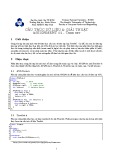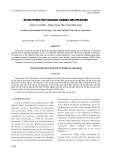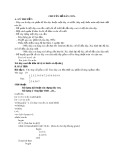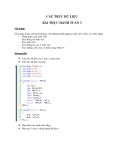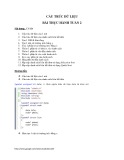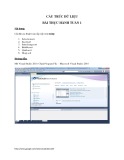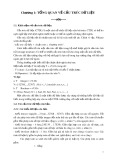
Using Array Arguments
Suppose you want to write a method to determine the minimum value in a set of
parameters. One way would be to use an array. For example, to find the smallest of
several int values, you could write a static method called Min with a single parameter
representing an array of int values:
class Util
{
public static int Min(int[] paramList)
{
if (paramList == null || paramList.Length == 0)
{
throw new ArgumentException("Util.Min");
}
int currentMin = paramList [0];
foreach (int i in paramList)
{
if (i < currentMin)
{
currentMin = i;
}
}
return currentMin;
}
}
To use the Min method to find the minimum of two int values, you would write this:
int[] array = new int[2];
array[0] = first;
array[1] = second;
int min = Util.Min(array);
And to use the Min method to find the minimum of three int values, you would write this:
int[] array = new int[3];
array[0] = first;
array[1] = second;
array[2] = third;
int min = Util.Min(array);

You can see that this solution avoids the need for a large number of overloads, but it does
so at a price: You have to write additional code to populate the array passed in. However,
you can get the compiler to write some of this code for you by using the params keyword
to declare a params array.
Declaring params Arrays
You use the params keyword as an array parameter modifier. For example, here's Min
again, this time with its array parameter declared as a params array:
class Util
{
public static int Min(params int[] paramList)
{
// code exactly as before
}
}
The effect of the params keyword on the Min method is that it allows you to call it by
using any number of integer arguments. For example, to find the minimum of two integer
values, you would write this:
int min = Util.Min(first, second);
The compiler translates this call into code similar to this:
int[] array = new int[2];
array[0] = first;
array[1] = second;
int min = Util.Min(array);
To find the minimum of three integer values, you would write the code shown below,
which is also converted by the compiler into the corresponding code that uses an array:
int min = Util.Min(first, second, third);
Both calls to Min (one call with two arguments and another with three arguments) resolve
to the same Min method with the params keyword. And as you can probably guess, you
can call this Min method with any number of int arguments. The compiler just counts the
number of int arguments, creates an int array of that size, fills the array with the
arguments, and then calls the method by passing the single array parameter.

NOTE
C and C++ programmers might recognize params as a type-safe equivalent of the varargs
macros from the header file stdarg.h.
There are several points worth noting about params arrays:
• You can use the params keyword on only one-dimensional arrays, as in this
example:
• // compile-time error
• public static int Min(params int[,] table)
...
• You can't overload a method based solely on the params keyword. The params
keyword does not form part of a method's signature, as shown in this example:
• // compile-time error: duplicate declaration
• public static int Min(int[] paramList)
• ...
• public static int Min(params int[] paramList)
...
• You're not allowed ref or out params arrays, as shown in this example:
• // compile-time errors
• public static int Min(ref params int[] paramList)
• ...
• public static int Min(out params int[] paramList)
...
• A params array must be the last parameter. (This means you can have only one
params array per method.) Consider this example:
• // compile-time error
• public static int Min(params int[] paramList, int i)
...
• The compiler detects and rejects any potentially ambiguous overloads. For
example, the following two Min methods are ambiguous; it's not clear which one
should be called if you pass two int arguments:
• // compile-time error
• public static int Min(params int[] paramList)
• ...
• public static int Min(int, params int[] paramList)
...

• A non-params method always takes priority over a params method. This means if
you want to, you can still create an overloaded version of a method for the
common cases. For example:
• public static int Min(int leftHandSide, int rightHandSide)
• ...
• public static int Min(params int[] paramList)
...
The first version of the Min method is used when called using two int arguments.
The second version is used if any other number of int arguments is supplied. This
includes the case where the method is called with no arguments.
Adding the non-params array method might be a useful optimization technique
because the compiler won't have to create and populate so many arrays.
Using params object[ ]
A params int array is very useful because it allows any number of int arguments in a
method call. However, what if not only the number of arguments varies, but also the
argument type? C# has a way to solve this problem, too. The technique is based on the
facts that System.Object (object) is the root of all classes, and that the compiler can
generate code that converts value types (things that aren't classes) into objects by using
boxing, as described in Chapter 8, “Understanding Values and References.” You can use
a params object array to declare a method that accepts any number of arguments of
objects, allowing the arguments passed in to be of any type. Look at this example:
class Black
{
public static void Hole(params object [] paramList)
...
}
I've called this method Black.Hole, not because it swallows every argument, but because
no argument can escape from it:
• You can pass it no arguments at all, in which case the compiler will pass an object
array whose length is 0:
• Black.Hole();
// converted into Black.Hole(new object[0]);
TIP
It's perfectly safe to iterate through a zero-length array by using a foreach
statement.

• You can call it by passing null as the argument. An array is a reference type, so
you're allowed to initialize an array with null:
Black.Hole(null);
• You can pass it an actual array. In other words, you can manually create the array
normally created by the compiler:
• object[] array = new object[2];
• array[0] = "forty two";
• array[1] = 42;
Black.Hole(array);
• You can pass it any other arguments of different types, and these arguments will
automatically be wrapped inside an object array:
• Black.Hole("forty two", 42);
//converted into Black.Hole(new object[]{"forty two", 42});
The Console.WriteLine Method
The Console class contains many overloads for the WriteLine method. One of these
overloads looks like this:
public static void WriteLine(string format, params object[] arg);
Here's an example of a call to this method, that you met in Chapter 10, “Using Arrays and
Collections”:
Console.WriteLine("Name:{0}, Age:{1}", name, age);
The compiler resolves this call into the following:
Console.WriteLine("Name:{0}, Age:{1}", new object[2]{name, age});
Using params Arrays
In the following exercise, you will implement and test a static method called Util.Sum.
The purpose of this method is to calculate the sum value of a variable number of int
arguments passed to it, returning the result as an int. You will do this by writing Util.Sum
to take a params int[] parameter. You will implement two checks on the params
parameter to ensure the Util.Sum method is completely robust. You will then call the
Util.Sum method with a variety of different arguments to test it.
Write a params array method
1. Start Visual Studio 2005.



